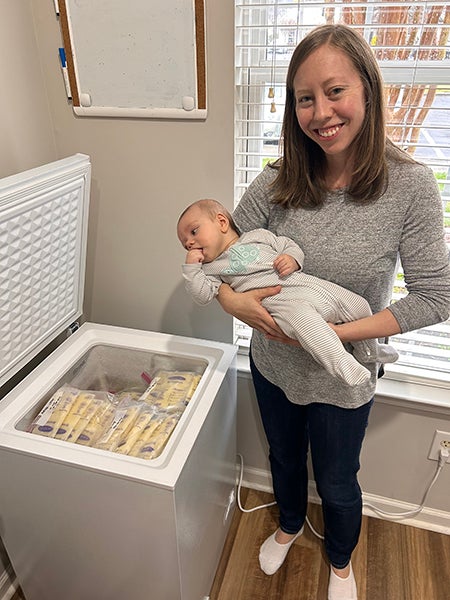Paying it Forward: Maggie Bailey's Milk Bank Donation Story
May 15, 2024
By: WakeMed Health & Hospitals
Categories: Pregnancy, Women's, Stories
Tags: Milk Bank, Mothers Milk Bank, Donor Milk, breast milk
Ever noticed that most women go into labor and deliver their babies at night? Well, this is no coincidence. When a woman becomes pregnant, a hormone called oxytocin increases gradually in her body from the first through the third trimester. Melatonin, another hormone, interacts with oxytocin encouraging uterine contractions. This hormone is at it's peak during the evening hours because it's also responsible for helping people fall asleep. Voila — high oxytocin plus high melatonin and baby is on the way. Gratefully, it is also during the evening and overnight hours that families are together, so a laboring mom also often has the most support during those evening hours.
Bradley Bailey is Born
This story played out no differently for Maggie Bailey, a first-time mom. Around 11:30 at night on November 25, 2023, she began experiencing contractions. Within minutes, her contractions were three minutes apart, so she and her husband began moving quickly to get to the hospital.
They packed hospital bags, made final preparations of their home and then sped off to WakeMed Raleigh Campus around 2:00 in the morning. To their surprise, Maggie was already five centimeters dilated. She decided on an epidural to make the pain more tolerable, and her son, Bradley, arrived just before noon on November 26, 2023.
"I expected labor and delivery to take a lot longer since he was my first child, but it came on suddenly and quickly. The pushing was three hours, so that was an experience. Also, I decided not to be a martyr and went for the epidural."
Bradley came into the world quietly, and the care team, led by obstetrician Alison Kalinowski, MD, a WakeMed community provider through Kamm McKenzie, realized he wasn't breathing. The team took him away for observation. Within ten seconds, he began crying loudly, which was just the sound they all hoped for.
"He startled us at first, but he's been great ever since."

An Introduction to the WakeMed Mothers' Milk Bank
Upon checking his vital signs, the care team had concerns about Bradley passing his blood glucose test. His blood sugar levels could be addressed by breast milk, but Maggie's milk had not come in yet. She was producing colostrum only, so the team suggested she utilize the services of the WakeMed Mother's Milk Bank until her milk came in.
"The lactation consultants recommended I consider donor milk. I'd never even heard of this before, and since it was important to us for our son to receive mothers' milk, I readily agreed."
The couple purchased 500 milliliters of milk. Within a couple of days of their discharge and return home, Maggie's mature milk came in, and she was able to begin breastfeeding.
Due to a tongue tie, Bradley had problems latching on, so Maggie expressed her milk and bottle fed him, opting to nurse just once per day. With the intensity of pumping, soon her body was producing much more milk than her son was consuming. She stored it in the freezer, and in time, the freezer was full of milk.
A Chance to Pay it Forward
On April 18, 2024, with a freezer overflowing with milk, Maggie proudly made her first donation to the WakeMed Mothers' Milk Bank — that had provided for her son during their time of need.

"The process to become a donor was pretty seamless. I reached out to the staff, filled out a form, provided my medical history, went to an appointment with LabCorp for blood work screening and once I passed all eligibility criteria, I officially became a donor."
Since Maggie and her family live in Durham, they also took advantage of WakeMed's courier service for milk pick up.
"It was so easy. I basically handed over the frozen milk to the courier who then took it to the WakeMed Mothers' Milk Bank."
Maggie felt good knowing that there were such stringent guidelines for becoming a donor. Stipulations prevented a woman with active mastitis from donating. There were also restrictions for women who consumed alcoholic beverages and/or used particular medications, including recreational drugs.
Maggie was compelled to become a donor because in reflecting on her own time of need, she was very grateful that donor milk was available. It was important to her to pay it forward and provide for other babies in need.
"I think as a first-time mom who was unable to provide for my son, the option to feed my son with donor milk gave us peace of mind."
Maggie went from not having sufficient supply to dealing with a huge oversupply. This reality brought her full circle because after the initial purchase, she had two more times during her son's young life that she needed donor milk. One was when Bradley was about a month old, and she developed mastitis. Another time was when he was going through a growth spurt.
"I made a frantic late-night call to my pediatrician and was on the nurse helpline pleading for a prescription for donor milk. Remembering these moments, now that the tables are turned, I want to give."
A Gift That's Easy to Give
Today, Maggie is back at work and pumping in order to keep up her supply. She hopes to continue providing milk for her son as well as the Mothers' Milk Bank.
She finds giving easy because she simply blocks her calendar at work a couple times a day, so she can pump. She then labels and freezes the milk. Once she has another large overage, she plans to donate.
"About half goes into bottles in the refrigerator to feed my son and the other half is immediately bagged, labeled and put in the freezer.
Looking back on her experience, Maggie encourages other moms, who are able to do so, to give this precious gift.
"While there could be extra time involved, especially for those who are exclusively breastfeeding, it's worth pumping for another baby in need. I was very grateful to have the milk bank for my son and to know the milk had been carefully vetted and sterilized for safe usage. It's a commitment worth making to help someone else. Being able to to provide milk for another mom and baby is a huge blessing and a huge help."
Become a Milk Donor
Interested in becoming a milk donor, or simply interested in learning more about the WakeMed Mothers’ Milk Bank? Use the contact information below. Interested in sharing your milk donor story? Email us: info@wakemed.org and put “Milk Bank Donor” in the subject line.
WakeMed Mothers’ Milk Bank
1900 Kildaire Farm Road
Cary, NC 27518
Map & Directions
919-350-8599
Email: mothersmilkbank@wakemed.org
Support the Milk Bank
You can support the WakeMed Mothers’ Milk Bank by making a gift to the WakeMed Foundation and designating it to our milk bank. Donate here.